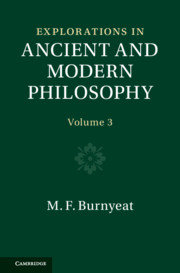Book contents
- Explorations in Ancient and Modern Philosophy
- Explorations in Ancient and Modern Philosophy
- Copyright page
- Contents
- Illustrations
- Preface
- Acknowledgements
- Abbreviations
- Introduction
- Part I The Republic
- Part II The past in the present
- Chapter 9 Plato
- Chapter 10 James Mill on Thomas Taylor’s Plato: Introduction
- Chapter 11 What was ‘the common arrangement’? An Inquiry into John Stuart Mill’s boyhood reading of Plato
- Chapter 12 The past in the present: Plato as educator of nineteenth-century Britain
- Appendix: The archaeology of feeling
- Bibliography
- Index locorum
Chapter 9 - Plato
from Part II - The past in the present
Published online by Cambridge University Press: 24 March 2022
- Explorations in Ancient and Modern Philosophy
- Explorations in Ancient and Modern Philosophy
- Copyright page
- Contents
- Illustrations
- Preface
- Acknowledgements
- Abbreviations
- Introduction
- Part I The Republic
- Part II The past in the present
- Chapter 9 Plato
- Chapter 10 James Mill on Thomas Taylor’s Plato: Introduction
- Chapter 11 What was ‘the common arrangement’? An Inquiry into John Stuart Mill’s boyhood reading of Plato
- Chapter 12 The past in the present: Plato as educator of nineteenth-century Britain
- Appendix: The archaeology of feeling
- Bibliography
- Index locorum
Summary
Plato’s philosophical writings have over the centuries evoked widely differing styles of response. Platonist metaphysical systems have been created, as by his first successors in the Academy, down to Plotinus and later Neoplatonists and beyond; while the questioning spirit they evince was what fuelled the scepticism of Arcesilaus and Carneades in the Hellenistic period, and what most impressed James Mill and George Grote, the nineteenth-century British ‘Philosophical Radicals’. Both types of response agreed, however, in rejecting what the dialogues call ‘opinion’, the metaphysicians because it lacks the security and clarity of true knowledge, the sceptics and radicals because it leaves prevailing norms unquestioned. They all took from Plato the precept: Think for yourself, whatever opinion or the prevailing norms may be. And from the beginning they disagreed among themselves too, with Speusippus, Plato’s nephew and his successor as head of the Academy, already rejecting the dialogues’ theory of transcendent Forms. Where the theory was embraced, it was developed further than its originator ever did himself or perhaps could have done. Plato wrote for eternity, to open minds and encourage independent thought in any reader, whatever their historical circumstances.
- Type
- Chapter
- Information
- Explorations in Ancient and Modern Philosophy , pp. 241 - 263Publisher: Cambridge University PressPrint publication year: 2022

